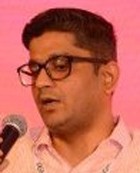Given that a miniscule percentage of the total bookings are happening online – which ranges from 15-18 percent – Rajat Girdhar, Director Marketing, Makemytrip.com is of the opinion that hotels and OTAs can complement instead of competing with each other. An exclusive:

DIRECTOR MARKETING,
MAKEMYTRIP.COM
With the unprecedented growth of e-commerce in India, OTAs have become formidable entities. Riding high on the back of a robust inventory, a simplistic user-interface and attractive deals for consumers, there are no prizes for guessing that they are here to stay. Rajat Girdhar, Director Marketing, Makemytrip.com shared why OTAs had become an important entity, stating that “We are an online company and are in the business of selling products online. So, we know the space well, in terms of how to develop a product that consumer understands – products mean a website or an app. We develop them keeping in mind where consumer understands what to book, how to book and where to book.” He underlined the difference between hospitality industry and OTAs noting that they were in the business of giving a consumer great experience in terms of venues through their properties. “They are in the business of providing quality service and great F&B for the consumer. So, to my mind, there is a disconnect between what we do and what they do. Our right to succeed stems out of the sheer fact that we are an online product that is very good at marketing,” he explained.
He pinned the success of OTAs on the ease of booking that it brought itself with. “If you go to any international hospitality website, if there are hundred room rates, they will publish all of them. It is very confusing for the consumer. They do not understand – and maybe they will take time to catch up to the fact that – people do not need intricate details like King’s bed non smoking and King’s bed smoking to choose from,” Rajat detailed.
“Till the time they do understand this, and worldwide booking is very important for OTAs, I think we will further improve our product. The only advantage that they have is the margin of price which they can transfer to the clientele, making it a little cheaper for clientele to get accommodation. And, it is fair enough as they are suppliers, so they would have a certain pricing advantage,” he further said.
Adding that with the ease of bookings and cancellations, and the whole idea of having a better consumer interface wherein the consumer knew where to approach if there were any issues, were areas that whosoever solved first was going to gain the most in terms of businesses, he informed “Online bookings are still a miniscule percentage of overall bookings in India; only 15-18 bookings happen online. When you have over 80 percent bookings that still go offline, I think there is enough space for everyone to grow.”
Sharing his understand on the growth of internet penetration and its impact on growing businesses for OTAs, Rajat noted that India was uniquely placed in the sense that it had skipped stages in IT revolution. “We never really had a desktop revolution. We skipped stages and much of India is already into Smartphone. Therefore, this personal device becomes the most important means to connect to potential business for us,” he said.
Further detailing the importance of smartphones in reaching out to a larger consumer base, he said “apps are a crucial cog in the wheel for us. Over fifty percent of our overall bookings are happening through apps. It is already the biggest thing. We are concentrating on improving the consumer experience on the mobile.” When asked to highlight some of the improvements put forth by makemytrip.com in the same, he shared “some of the improvements are that now I can send you a push notification on the browser and catch extra stuff that it was not able to do in the past. All these add-ons are helping improving our capabilities.”
For many, what remains a little confusing that despite the resources and understanding of how markets operated, hotels were, still, playing a catch up game with OTAs. Rajat decoded it saying that hospitality in India was a unique market where there was no standardization. “A three star hotel in Delhi is characteristically different from a three star hotel in Ajmer. So, as a consumer, you would prefer someone telling you the difference between the two before you proceed with your bookings. We add value to consumer’s spending,” Rajat said.
He also pointed toward the bulk of data generated by them, making them the de-facto research tool. “Lot of people use us as a research tool. They might or might not formalize the deal directly with the hotel. What we are counting on is the value we lend, in terms of what to choose and why to choose. There are consumer reviews that are in-depth, unbiased and when one chooses to book, the consumer can make truly an informed choice,” he explained.
Given that OTAs took away a major chunk of revenues generated by hotels – commissions ranging from 17-25 percent – some hotels have begun muscling their own websites and online presence. Rajat, however, opined that commission that OTAs charged was a very small part of a hotel’s revenue. “I don’t think hotels are worried too much about it, especially smaller brands are not concerned. On the contrary, they are more than happy to get clients through us; it saves them the cost of marketing their products – which otherwise would be way higher than the commission they pay us,” he reasoned. Adding that it was larger brands that were trying to make their own products and wished clients to come directly to them, he said “they have the resources to spend on marketing and outreach.”